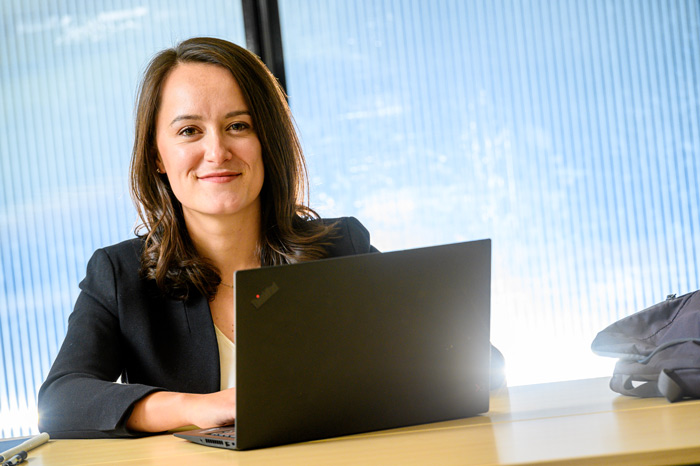A GYM OF THEIR OWN
By | Fall 2019
MBA STUDENT’S STARTUP FOCUSES ON THE SPECIFIC TRAINING NEEDS OF YOUNG FEMALE ATHLETES
As a high school lacrosse player, Phoebe Tzannes sought out extra training to build strength and improve her chances at a collegiate career. But when she joined a training program for high school athletes, her experience was that of many teenage girls in the same position. “You walk into a gym, and you’re 14 years old and there’s some 250-pound football player benching,” she said. “You’re not going to be like, ‘Oh, this is a space where I’m going to get better as an athlete,’ You’re immediately intimidated and kind of shut off. It’s just not a space that’s built for you.”
It was a less-than-ideal environment, but it eventually was the spark inspiring Tzannes to reimagine a whole new system for conditioning and training pre-collegiate female athletes.
Tzannes was both a gifted and hardworking athlete growing up. She played lacrosse at Vassar College and then spun athletics into a career as a sales representative for the Boston Celtics after graduation. Following that, her interests began to narrow. She discovered her love of working with young female athletes as development manager at Revolution Lacrosse (REV), a New England–based lacrosse and leadership training program for girls.
Hoping to eventually start her own company, Tzannes left REV to pursue an MBA at Notre Dame in the fall of 2018. She was especially eager to get involved at the University’s IDEA Center, an on-campus incubator that has helped launch dozens of revenue-generating startups since its founding two years ago. Working at the center as an analyst, she became increasingly inspired to start a venture of her own, ideally in the world of sports.
A contact at the center introduced Tzannes to Whitney Bouey, a like-minded student in the IDEA Center’s ESTEEM Graduate Program with a background in the world of fitness classes. At their first brainstorming session, the women hit upon the idea for PWR: a strength and conditioning program that will help female pre-collegiate athletes train in a correct, injury-reducing manner in a supportive, healthy environment.
At PWR (pronounced “power”), entire sports teams or groups of individual girls will attend after-school classes led by strength and conditioning coaches. She envisions expanding the curriculum beyond workouts to include motivation, leadership, nutrition and the “many other things that go into being a great athlete.”
Thanks to mentorship and a $10,000 grant from the IDEA Center’s newly launched Race to Revenue program, Tzannes spent last summer working with Notre Dame Athletics’ strength and conditioning staff to develop PWR’s pilot training program: building relationships, learning about kinesiology, scouting out facilities and researching equipment for PWR’s first physical location. She aims to open the gym — hopefully, the first of many — in Naperville, Illinois, soon after completing her MBA in spring 2020.
The more she works on making PWR into a reality, the more Tzannes finds herself wondering, “Why haven’t I thought of this until now? Why is no one doing this?”
 Young female athletes are two to nine times more likely to tear their ACL than their male counterparts, depending on the sport. Although biomechanical differences play a role, Tzannes said, research shows proper training can help girls prevent injury. This is especially true today, as young athletes specialize in a single sport at younger and younger ages. “And if you’re not doing the cross training, you are overdeveloping certain muscles and under-developing others, which is leading to a much higher incidence of all these injuries.”
Young female athletes are two to nine times more likely to tear their ACL than their male counterparts, depending on the sport. Although biomechanical differences play a role, Tzannes said, research shows proper training can help girls prevent injury. This is especially true today, as young athletes specialize in a single sport at younger and younger ages. “And if you’re not doing the cross training, you are overdeveloping certain muscles and under-developing others, which is leading to a much higher incidence of all these injuries.”
Personal trainers have always been an (expensive and often unrealistic) option for teen athletes. And, as Tzannes learned firsthand, group youth training programs do exist but are typically designed for and centered around boys. “The things that we need to strengthen are entirely different,” she explained. “Boys are a lot more top-heavy, girls are a lot more bottom-heavy. We need to stretch more. We need to strengthen our hamstrings and abs to prevent the ACL tears that we’re a little bit more prone to.”
“So we’re both giving a proper program to train these young women, young athletes — and also creating a space that’s much more tailored toward where they’re going to be more comfortable, but also coached correctly, motivated correctly.”
As she works on PWR, Tzannes builds on the important lessons she learned about helping young athletes succeed and improve at REV, the lacrosse leadership program. “Girls really thrive when they’re surrounded by a strong community,” she said. “You saw how they would light up when they got on the field and they were around people who weren’t judging them.”
She also noticed how resistant many of the young players were to risking failure when learning new and advanced skills. “When they first started the program, they wouldn’t even want to try because they weren’t going to be good at it,” she recalled. “And I would just say, ‘The entire point of this is you’re bad at it. You’ve never done it before. Of course you’re not going to be good at it.’”
Now Tzannes is the one taking a risk. She considered taking a more traditional route, doing a summer internship and working in consulting or brand management for a few years after graduation. “I was like, ‘Oh, I need to learn these things before I can start my own thing,’” she said. But the Race to Revenue funding “took some of that risk away. That was huge. And I realized, the only reason that I was putting off starting my own thing, was that I was afraid it wasn’t going to work. Which didn’t really seem like a good reason not to do it.”
“I had no idea whether it was going to be something I would pursue full time,” she added. “I hoped it would work out. And I’m still kind of in the progress of building it. But I had no expectations that it would all work out like this.”
Photo credit: Matt Cashore (ND ’94)


Comments